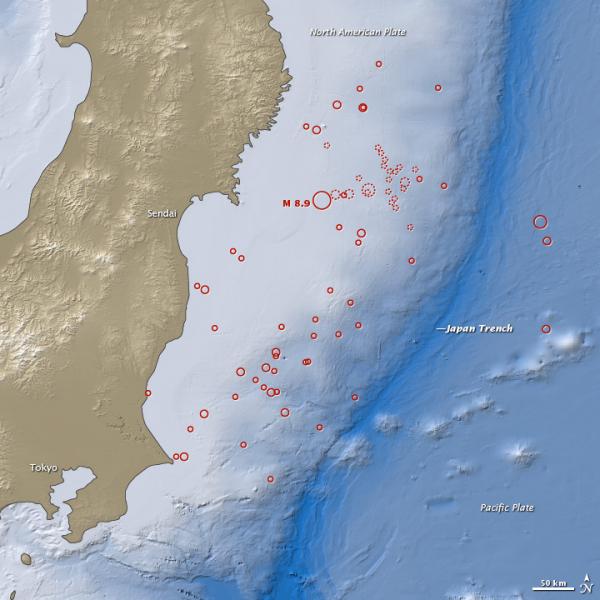
Science Journalist Apologizes for Newsweek Quake Article

SAN FRANCISCO — Highlighting the occasional tensions between the scientific community and journalists who write about science, popular science writer Simon Winchester apologized to geoscientists for a March 2011 article in which he suggested that earthquakes on one side of the Pacific could trigger temblors on the other.
However, while he acknowledged that he had presented the theory without enough caveats to cover the complexities of earthquakes, Winchester said he stands by the ideas he presented in that article.
"I am just hoping that anyone with tomatoes is not sitting in the front row," Winchester told an audience of scientists Monday (Dec. 5) here at the annual meeting of the American Geophysical Union (AGU).
The bulk of Winchester's talk focused on his book, "Atlantic: Great Sea Battles, Heroic Discoveries, Titanic Storms, and a Vast Ocean of a Million Stories" (Harper Perennial, 2011), a "biography" of the Atlantic Ocean and the human stories set there. But from the beginning, the author acknowledged that many in the audience were there because of his Newsweek article, written in the aftermath of the Japanese earthquake and tsunami that killed more than 15,000 people. In the article, titled "The Scariest Earthquake is Yet to Come," Winchester pointed to the Japan quake, an 8.8-magnitude February 2010 quake in Chile, and a 6.1-magnitude February 2011 quake in New Zealand, saying that there was one corner of the Pacific Ocean in British Columbia, left unscathed. That region's time was coming, he suggested, saying that giant quakes ring the Earth like "a great brass bell, "triggering other mega-quakes in far-off regions.
Seismologists and other earthquake experts immediately pushed back, saying that while British Columbia is a seismically active area, there is no evidence that quakes along the coast of Japan cause quakes thousands of miles away.
"There is no evidence for a connection between all of the Pacific Rim earthquakes," Nathan Bangs, a geophysicist who studies tectonic processes at the University of Texas Institute for Geophysics, told LiveScience's sister site Life's Little Mysteries in March. "I don't know what the basis is for the statements and implications in the Newsweek article, but there is no evidence that there is a link."
After several oblique references to his March article, and after speaking for nearly an hour about Atlantic shipwrecks and the romance of the sea, Winchester addressed the Newsweek controversy head-on, explaining how the piece came to be. He was finishing up a lecture on his book "The Alice Behind Wonderland" (Oxford University Press, 2011) in New York, he said, when an editor from Newsweek called and asked for a story. (That book explores the story behind "Alice in Wonderland.")
Sign up for the Live Science daily newsletter now
Get the world’s most fascinating discoveries delivered straight to your inbox.
The editor "rang me to say there's been this extraordinary earthquake in Japan, can you write a quick 900 words on it by 4:00 p.m.," Winchester said. "Which was about 90 minutes hence." [Japan's Biggest Earthquakes]
Acknowledging that the Earth's response after a quake is not as simple, Winchester apologized to the researchers still holding his Newsweek piece against him.
"I am sincerely sorry for getting it wrong and rushing into print with something that, had I thought of it more carefully, I would have been more circumspect," he said.
At a press conference after the talk, Winchester said that he does stand by the belief that large earthquakes may trigger complementary large quakes over very long distances. Given more time to write the article, he said, he would have presented the idea with more "maybes."
"I probably would have said much the same, I think, but I would have inserted caveats and said that it's my eccentric belief based on little evidence, but I want to get it across to people," he said.
You can follow LiveScience senior writer Stephanie Pappas on Twitter @sipappas. Follow LiveScience for the latest in science news and discoveries on Twitter @livescience and on Facebook.

Stephanie Pappas is a contributing writer for Live Science, covering topics ranging from geoscience to archaeology to the human brain and behavior. She was previously a senior writer for Live Science but is now a freelancer based in Denver, Colorado, and regularly contributes to Scientific American and The Monitor, the monthly magazine of the American Psychological Association. Stephanie received a bachelor's degree in psychology from the University of South Carolina and a graduate certificate in science communication from the University of California, Santa Cruz.










